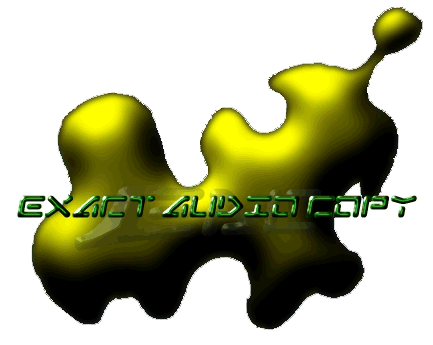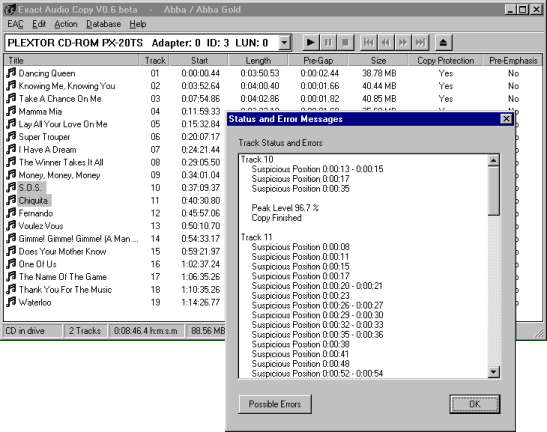About Me
Technology
Sound Editor
Documentation
Registration
Download
Tips & Specs
Contact
Whats New
Forum
Links
FAQ
Last updated
10.12.00
Amazing Media: Web Advertising YOU Control!
Introduction
EAC is a new audio grabber for CD-ROM drives. The main differences towards most other audio grabbers :- Low registration costs (just a postcard and a stamp)
- It works with a new technology, reading audio CDs almost perfectly. If there are any errors that can't be corrected, it will tell you on which time position the (possible) distortion occurred, so you could easily control it with e.g. the media player
Features of EAC
- Usage of the Windows 95 and Windows NT ASPI Interface, so both SCSI and ATAPI CD-ROM drives are supported
- Hidden sector synchronization (jitter correction)
- Secure, fast and burst extraction method selectable. Fast extraction should get the same speed as other grabbers, but is probably not exact anymore. Burst mode just grabs the audio data without any synchronization.
- Read error and complete lost of sync detection and correction in secure modes, as far as possible
- Output of time positions of all non exact corrections and listen to these positions
- Copy of ranges of music data, not only tracks
- Automatic Speed reduction on errors and fallback afterwards
- Normalization of extracted audio
- Usage of the Windows Audio Compression Manager (ACM Codecs) for direct compression e.g. to MP3 waves
- Support for the BladeEnc DLL that is usable like an ACM Codec for online MP3 compression
- Support of external MP3, VQF, RA and AAC encoders for automatic compression after extraction
- Batch compression and decompression of/to WAV files
- Compression offset support for exact compression/decompression
- Detection of pre-track gaps
- Detection of silence in pre-track gaps
- Automatic creation of CUE sheets for CDRWin, including all gaps, indicies, track attributes, UPC and ISRC
- CD player functionality and prelistening to selected ranges
- Automatic detection of drive features, whether a drive has an accurate stream and/or does caching
- Sample Offsets for drives with no accurate streams, including the option of filling up missing samples with silence
- Option for synchronizing tracks for non-accurate stream drives
- Filename editing with local and remote CDDB database and cdplayer.ini support and more features like ID3 tagging
- Lyric database support from www.lyrics.ch
- Browse and edit local database
- Certified Escient ® CDDB(TM) Compatible
- Local CDDB support
- Record and Loop Record functions for recording from LP, radio, etc.
- Automatic rename of MP3 files according to their ID3 tag
- Catalog extraction function
- Multisession (CD-Extra) support
- CD-Text support
- CD write support for some drives
- ID3 Tag editor with drag and drop possibility from track listing and database
- Glitch removal after extraction
- Small WAV editor with functions for delete, trim, normalize, pad, glitch removal, pop detection, interpolation of ranges, noise reduction, fade in/out, undo and more
- Program is Cardware, so feel free to copy
Known Bugs
- Some older CD-ROMs cause extreme jitter errors to occur on some CD-ROM drives causing the extraction to slow down to a non acceptable value (e.g. Mitsumi FX240)

